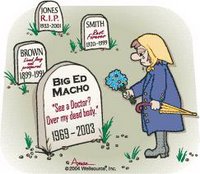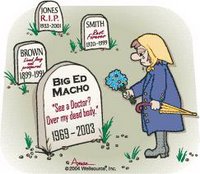
Have you had your phytos today? Once upon a time it was thought that fats, proteins, carbohydrates, vitamins, and minerals were all the nutrients necessary for growth and health. Now we know there's another group of nutrients necessary for optimal health -
phytonutrients. Despite its high tech ring, "
phytonutrient" (from the Greek phyton for "plant") simply means a "nutrient from a plant."
Molecular science is finally confirming what mother always told us: "Eat your fruits and vegetables." As you will soon learn, the power-packed nutrients that give fruits and vegetables their many colors also provide a lot of Mother Nature's medicine.
4 WAYS PHYTOS ARE HEALTH FOOD
While there are many phytos that have been identified, there are probably thousands more that remain to be discovered. The best known phytos are carotenoids, flavonoids, and isoflavones. Carotenoids include yellow, orange, and red pigment in fruits and vegetables. Dark, green, leafy vegetables are rich in the carotenoid, beta carotene, but the usual yellow color is masked by the chloraphyll, the green pigment in the vegetables. Flavonoids are reddish pigments, found in red grape skins and citrus fruits, and isoflavones can be found in peanuts, lentils, soy, and other legumes. You're familiar with vitamins, now we have "phytomins," which are less familiar, but equally important, health-promoting substances in food.
1. Phytos protect the body and fight disease. One day while I was watching my garden grow, I wondered how plants stay so healthy. They don't wear sunscreen or a raincoat; they don't go to the doctor. The answer: they make their own disease-fighting chemicals we call phytochemicals - phytos for short. The same phytos that help keep the plant healthy keep our bodies healthy. Phytos provide medicine for cell health. They help the cells repair themselves by stimulating the release of protective enzymes or those that rebuild damaged cells. Other phytos inhibit cancer-producing substances, reducing their ability to damage cells. When the repair squad can stay ahead of the damage, degenerative diseases, such as multiple sclerosis and arthritis, can't get started. Phytos also keep cancer and cardiovascular disease in check.
2. Phytos fight cancer. Cancer starts with a cell out of control. As cells wear out or get injured, they replace themselves with new and healthy cells. Within each cell a network of inner controls (the DNA) keeps this process in check. But with this cellular cloning happening millions of times a minute, there are many opportunities for an occasional cell to defy the rules and get out of control. It may go on reproducing itself, eventually damaging the organ of which it is a part. Like a band of terrorists, the out-of- control cancer cells also try to infiltrate other organs by entering the body's blood vessels and traveling to places near and far, a devilish process called metastasis. Some cancer cells are probably formed in every person every day. Yet the body's own defense system recognizes these invaders and attacks. Almost always, the body wins the battle, so that these cancer cells either never have a chance to develop, or they are destroyed before they have a chance to spread or cause damage. Occasionally, the body's defenses aren't strong or effective enough to overcome these rebellious cells, and the person "gets cancer."
Phytos fight on the side of the body. Carcinogens (cancer-causing substances) can enter the body from all kinds of sources: tobacco smoke, pollution, pesticides, or just plain bad luck. Carcinogens attempt to enter cells and change how they develop. But antioxidant phytos nab the carcinogens before they have a chance to cause cancer in the cell. If the carcinogen manages to infiltrate the internal controls of the cell, other kinds of phytos help to shut down the precancerous cell so it does not multiply into a gang and overrun the neighborhood. This phyto protective mechanism explains why cultures whose diets are rich in plant foods have the lowest rates of cancer. The Mediterranean diet, for example, emphasizes garlic, tomatoes, onions, fruits, whole grains, and olive oil - all of which contain cancer-fighting phytos.
Phytos seem to be the most cancer protective against epithelial cells, those that form the lining of organs, such as the mouth, lungs, bladder, uterus, and digestive tract. These cells are the ones most exposed to carcinogens. They also have a rapid turnover rate, meaning they're replaced often. Even though there are anticancer phytos in all plant foods, those found in fruits and vegetables seem to be the most powerful. It's not only what fruits and vegetables contain that make them effective cancer-fighters, but it's also what they don't contain-saturated fats and chemical pollutants frequently found in animal foods.
3. Phytos help hearts. Antioxidant phytos can interfere with the damaging effects of LDL cholesterol on arteries. LDLs, the bad cholesterol, become harmful after an encounter with a free radical, during which they are oxidized. And when artery walls are damaged by free radicals, it's easier for oxidized LDLs to build up there. Antioxidant phytos, especially beta carotene, can block this process and thus prevent cardiovascular disease.
NUTRITIP
Is Alcohol Good for Your Health?
The studies claiming longevity and better health for wine drinkers should be taken with a grain of salt. It's likely that the health benefits were due to the antioxidant properties of the red grape skins rather than the wine itself. The harmful effects of potentially excess alcohol on health may far outweigh the benefits of moderate intake. Better to eat a handful of red grapes or blueberries than drink a glass of wine if it's health you're after.
4. Phytos boost immunity. Phytos, such as carotenoids and flavonoids, mobilize the body's immune cells, called natural killer cells and helper-T cells. These act like a protective armor to keep invading pollutants and germs from entering the cell.
ALL ABOUT ANTIOXIDANTS
One of the most important roles of phytos is acting as antioxidants. Here's why your body needs antioxidants.
When the cells in your body burn fuel for energy they burn oxygen as well. When oxygen is burned, molecules called free radicals are released. Free radicals are like vandals loose in your body. They have at least one extra electron, giving them a negative charge, which drives them around the body looking for cells with which they can react. These reactions damage the DNA and other substances in cells. Much of the time the cells can repair themselves, but the cell neighborhood can't protect itself from these gangs of free radicals all by itself.
Enter the antioxidant "police." Antioxidant molecules have a positive charge, so when they meet up with the negatively-charged free radicals they neutralize them - handcuff them so they can't do any damage. Your body needs more antioxidant police officers as you get older, since the body's ability to repair itself diminishes with age. Antioxidants also help to prevent damage by carcinogens, such as ultraviolet radiation, tobacco smoke, and environmental pollutants.
VITAL GREEN PLUS® - Over 50 Vegetables, Fruits and
PhytonutrientsVital Green Plus is a concentrated nutraceutical superfood containing over 50 vegetables, fruits and
phytonutrients. it helps fuel every cell with what your body needs to perform at peak efficiency. You can find this product (Vital Green Plus)
here at the Customer Product Store under the Wellness category.











